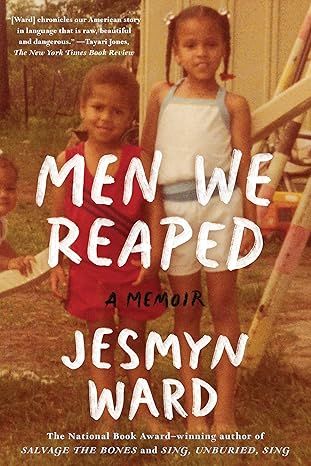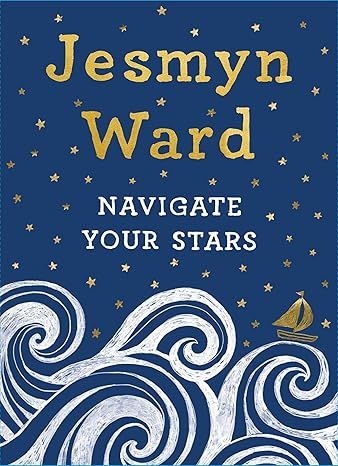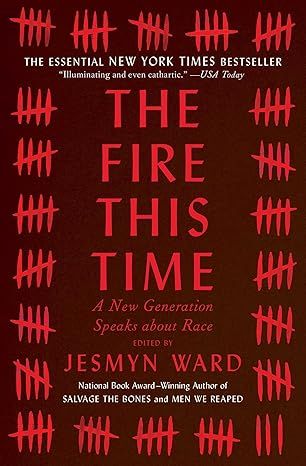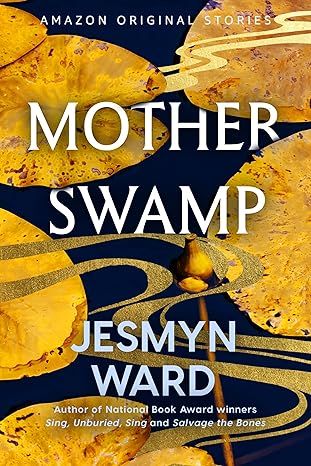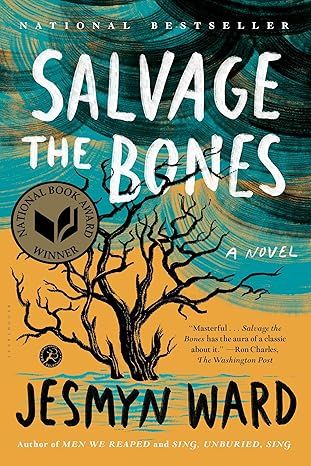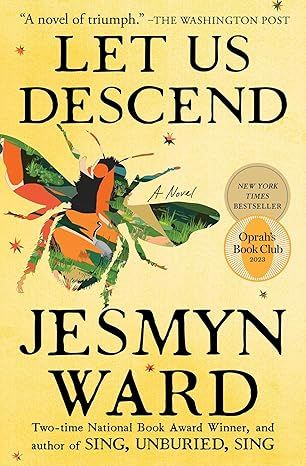Men We Reaped: A Memoir
4.5 out of 5
2,897 global ratings
Named a Best Book of the Century by The New York Times Book Review and New York Magazine
The two-time National Book Award winner and author of Salvage the Bones and Let Us Descend, contends with the deaths of five young men dear to her, and the risk of being a Black man in the rural South.
“We saw the lightning and that was the guns; and then we heard the thunder and that was the big guns; and then we heard the rain falling and that was the blood falling; and when we came to get in the crops, it was dead men that we reaped.” -Harriet Tubman
In five years, Jesmyn Ward lost five young men in her life-to drugs, accidents, suicide, and the bad luck that can follow people who live in poverty, particularly black men. Dealing with these losses, one after another, made Jesmyn ask the question: Why? And as she began to write about the experience of living through all the dying, she realized the truth-and it took her breath away. Her brother and her friends all died because of who they were and where they were from, because they lived with a history of racism and economic struggle that fostered drug addiction and the dissolution of family and relationships. Jesmyn says the answer was so obvious she felt stupid for not seeing it. But it nagged at her until she knew she had to write about her community, to write their stories and her own.
Jesmyn grew up in poverty in rural Mississippi. She writes powerfully about the pressures this brings, on the men who can do no right and the women who stand in for family in a society where the men are often absent. She bravely tells her story, revisiting the agonizing losses of her only brother and her friends. As the sole member of her family to leave home and pursue higher education, she writes about this parallel American universe with the objectivity distance provides and the intimacy of utter familiarity. A brutal world rendered beautifully, Jesmyn Ward's memoir will sit comfortably alongside Edwidge Danticat's Brother, I'm Dying, Tobias Wolff's This Boy's Life, and Maya Angelou's I Know Why the Caged Bird Sings.
272 pages,
Kindle
Audiobook
Hardcover
Paperback
First published September 15, 2014
ISBN 9781608197651
About the authors
Jesmyn Ward
Jesmyn Ward received her MFA from the University of Michigan and has received the MacArthur Genius Grant, a Stegner Fellowship, a John and Renee Grisham Writers Residency, and the Strauss Living Prize. She is the winner of two National Book Awards for Fiction for Sing, Unburied, Sing (2017) and Salvage the Bones (2011). She is also the author of the novel Where the Line Bleeds and the memoir Men We Reaped, which was a finalist for the National Book Critics Circle Award and won the Chicago Tribune Heartland Prize and the Media for a Just Society Award. She is currently an associate professor of creative writing at Tulane University and lives in Mississippi.
Read more
Reviews
Read-A-Lot
5
Courageous and Honest
Reviewed in the United States on October 13, 2013
Verified Purchase
This is a courageous book, in that Jesmyn lays bare the contents of her life in a way that maybe few authors could or would. I felt a sense of validation, after reading in the acknowledgment, "...I was still unsure I had written a memoir." I had this sense throughout the book that wow, this is her actual story, but the writing and telling of it feels like a novel. This makes the memoir a truly great read.
In her examination of her rearing and the loss of her brother and other young men from the neighborhood, she puts a microscope on the socioeconomic conditions that keep Black people mired in grief, leading to poor choices based on hopelessness. She moves through the deaths backwards in time, in order to bring the story forward. This makes the first death, that of her brother, intersect with the present time. This was a very interesting way of framing the memoir and an accusatory look is taken at the forces of racism, economic opportunity and the lack of choices that exist among the black poor.
The community at the center of this memoir is DeLisle,MS. The reader should see this as representative of any poor economically challenged neighborhood impacted by a racist society. She clearly traces how she was haunted by the forces of poverty, history and racism. She writes, "I looked at myself and saw a walking embodiment of everything the world around me seemed to despise: an unattractive, poor, Black woman."
The deaths of the men inquired in this book could have happened, indeed does happen far too frequently in poorblack,USA. This is not endemic to the south. I can hear Malcolm X in my head chastising northerners in the 60's, who some how thought they were at a geographical advantage. Malcolm admonished, "stop talking about the south, as long as you're south of the Canadian border, you're south."
Yet, despite the deaths, the despair and the grief, Jesmyn longs for home. "I knew there was much to hate about home, the racism and inequality and poverty, which is why I'd left, yet I loved it." With all of her accomplishments, Jesmyn had the courage and fortitude to share this story and return to her home which she dearly missed. She has crafted a memoir that is one of the best I have ever read, and may her story help provide a sliver of light on the conditions that give life to the hopelessness and carelessness that exists in all the DeLisles of USA.
Read more
7 people found this helpful
Eric Selby
5
The Plight of Blacks in Mississippi Made Real
Reviewed in the United States on September 29, 2013
Verified Purchase
"I knew that I lived in a place where hope and a sense of possibility were as ephemeral as morning fog, but I did not see the despair at the heart of our drug use," writes Jesmyn Ward of the area in Mississippi where she and her three siblings as well as their large extended family grew up and where most of them--the ones who have survived that is--still live. "Men We Reaped" is a poignant retelling not only of the author's family's lives but centered around the tragic deaths of five black young men within the span of five years, beginning with her only brother's death in 2000. She uses the wolf as her metaphor, the original name of the town was Wolf. And as her ex-boyfriend said, "They picking us off, one by one." The reader experiences, although not chronologically, the deaths of these men: accidents, suicide, a shooting... When the writer describes her womanizing father's love of pit bulls that he collected for the purpose of fighting other dogs, one becomes aware of the sadistic nature of this man in the scene where he cuts off one dog's tail without benefit of sedation. And that will lead into much more about the realities of just how awful life had to have been for all these women and children, many of whom were sired outside of marriage. One of the author's sisters has a baby when she is a mere thirteen years old. And, of course, as would be expected, that baby is raised by his maternal grandmother. All the stereotypes are made flesh in this memoir: drugs and drug dealing, overdosing, under and un-employment, even cousins marrying cousins (a fine old southern tradition by white racists I thought but apparently all races in the South): "In such small towns, in communities confined by race and class, this was inevitable." (page 109) Everyone knows--I think everyone should know anyway--that Mississippi ranks 50th of all the states in illiteracy, poverty and obesity. And quite possibly in racism as well. This is what Ms. Ward writes when describing why one of the young men who dies young left school: "The fact that he was a Black male barely scraping by in his classes meant he was seen as a problem. And the school administration at the time solved the problem of the Black male by practicing a kind of benign neglect. Years later, that benign neglect would turn malignant and would involve illegal strip searches of middle schoolers accused of drug dealing, typing these same students as troublemakers, laying a thick paper trail of imagined or real discipline offenses, and once the paper trail grew thick enough, kicking out the students who endangered the blue-ribbon rating with lackluster grades and test scores." I admire Jesmyn Ward's openness about the use of drugs in her own life, in the honesty she has dared when she knows full well this book is such an indictment upon the white people who have never really done what they--we since I am one of them--should have, bringing us up to date about the horrors of what happened as a result of slavery, of the aftermath of the Civil War with Jim Crow, of the continued racism that plagues this country. Alas...this: a flaw that is hardly the author's doing is this: there are several words--nouns and verbs--that don't have the needed "s"es as well as a strange pagination: from page 59 the reader is bounced to 70. At at 89 to 70 again. This publisher needs to hire a new copy editor!
Read more
5 people found this helpful
Book Junkie
5
Beautiful Memories of Lives Taken Too Soon
Reviewed in the United States on May 8, 2019
Verified Purchase
This is a novel that will stay with the reader. Jesmyn Ward is an exceptional writer, who bares her soul and gives voices to men lost. These voices sing of the multi-generational hardships, the strength to enjoy life in near defiance of the many obstacles surrounding them. They sing of their personal experiences, granting readers a real look at what the ever-present racism shapes and that which these men will not allow to be taken, as they hold fast to what they hold most dear.
This novel and memoir are a love letter of significant value to all Americans. It shows so much beauty in love, fierce spirit, and the absolute shame of this nation in not tending to the needs of all. Again, and again we are shown the huge disparity between race, "class", and the clear knowledge that no one is better than anyone. Intellect shines through, work ethic shines through, the push for true equality yet unreached shines through the darkness of forgotten people who are, every one deserving of much, much better and far more.
My thanks go to Jesmyn Ward and her many helpers for highlighting these and other critical issues while telling her stories that say so much in her words. I pray and I will act to see a far better future for the children of these men and women. I ask you to please read this book. It has so much to say and so much more we must act upon, regardless of how much melanin the reader was born with.
Read more
Shirly Payano-Griffin
5
Honest, REAL, heart-wrenching, and LIFE CHANGING!
Reviewed in the United States on October 11, 2020
Verified Purchase
Ward’s Men We Reaped is a dedication to the lives of five young, beloved, black men she lost to car accidents, murder, and suicide within a four-year span. A revelation of hard truths about the struggles of growing up black, lacking privilege, stability, and wealth are interlaced throughout. A candid description of the harsh reality that lies behind the stigmas of life as a minority, raised in a small town in Southern Mississippi is prevalent. Her experiences with racism, inequality, and self-hate bring her heartache, despair, emotional destruction, and self-destruction via drug and alcohol abuse. Circumstances plaguing a community with poverty, violence, drugs, and mental illness as they face racism, scant opportunities, self-hate, and a lack of trust is stripped down to the most honest depiction I have ever read. Ward brings a frank awareness to outsiders looking in, to grasp the grit and the reality of what life is like every day for those born into these circumstances, causing a domino effect of tragedies. Ward’s memoir calls for a shift in thinking; a shift of understanding, versus assuming. A movement is being called to change circumstances, instead of blaming and only acknowledging differences. A change of action in wanting better for a community of people that feel they are in a death trap is being pleaded, so that they may instead see a future with hope, as Ward did. She manages to pull herself out of the quicksand that was consuming those she loved around her.
Read more
2 people found this helpful
TheraP
5
How can I get you to read this book? It’s unforgettable!
Reviewed in the United States on March 13, 2018
Verified Purchase
Jesmyn Ward is a literary alchemist. She has woven the lives/deaths of 5 young black men, together with her own memories of growing up among them, and applied her skills as a writer to elevate pain, poverty, racism, drugs, alcohol and a lack of meaningful employment for most of her contemporaries, particularly the men - to elevate all these tragic consequences of segregation and slavery - into a kind of universal tragedy, which nevertheless feels redemptive because of the telling of it. And the how of the telling.
I spent much of the tail end of this book weeping. For its sadness. For its depth. For the courage to face and write so many painful truths. For the beauty of her prose, the stark honesty in revealing so much of herself, her love and grief for those cut down so young. For the wisdom and strength of black women struggling to raise children under such conditions. For the human wreckage this nation permits. For this woman, rising up to memorialize searing and painful truths.
I cannot forget this book. As a writer Ms. Ward is the Hilary Mantel of Mississippi. Someone who has transformed her own personal pain into exquisite prose. Someone fearless in writing about emotions, deeply understanding of her characters, honest yet sympathetic in portraying things which might be unspeakable under most circumstances, but which in her hands become cathartic, almost religious, even when most terrible.
She is my new favorite writer. And I’m just sorry that at 73, there are only so many more of her future books I’ll live to read.
Read more
68 people found this helpful
Mary Clark
5
Rage and Heartbreak Fill The Pages
Reviewed in the United States on April 8, 2021
Verified Purchase
This book speaks to my heart. I experienced the drug wars of the 1980s and 90s in my midtown NYC community, seeing it take children from neighbors’ families, and parents too, and friends who had given into despair due to AIDS. We are just beginning to understand what happened, analyze, and tell this story, these stories. That black communities were hardest hit is undeniable.
In this beautifully written book, Ward tells us the personal cost as she brings us the story of the small town Louisiana communities of DeLisle and Pass Christian in more recent times. Young black men are dying of drug overdoses, suicide or violence one after another. She asks herself why. What is happening to her friends and former schoolmates, people the same age as she is?
In telling their stories, Ward’s rage and heartbreak fill the pages. The young black men struggle with identity and poverty. The towns are poor, people are leaving, jobs scarce and often on distant oil rigs or in other towns. They have been hard hit by hurricanes. Industry has left the area. Life is a cycle of pain and loss. People dream of escape, but there is no escape from the bleak reality of their lives. This book is a must-read for understanding our recent social and economic past, as well as the current opioid epidemic. Overall, it is an eloquent witness to the effects of chronic racism in this country.
Mary Clark, author of Community: Journal of Power Politics and Democracy in Hell's Kitchen
Read more
4 people found this helpful
Amelie
5
This is a book for humanity!
Reviewed in the United States on September 23, 2014
Verified Purchase
This book is why I signed on to Amazon today...to leave a heartfelt, thoughtful review.
When I began reading Ms. Ward's book, I mentally said, "I've got to send copies to my family to read." See, I am from Mississippi, the Mississippi Delta. And the poverty, hopelessness, internal and external reminders of your nothingness playing on a loop are all too familiar to me. I left the Mississippi Delta in 1990 for college and law school after that.
Through the years, my voice has been stifled by the pain and hopelessness I feel when I watch or hear of the systemic poverty and lack of hope in Mississippi.
As a lawyer people often ask me to speak on my childhood, my life after leaving Mississippi, how I feel now when I return to visit my mom, my siblings, my dwindling aunts and uncles. I have never been able to verbalized the anguish, the torment that materializes in my dreams on a monthly basis and culminates with me falling into a black hole thick with sewage.
Until now, I hadn't read of a book that gave life to my childhood, to my mom's struggles and triumphs. Until Men We Reaped, I felt alone and stuck in these memories. Thanks be to Ms. Ward for trudging through her memories and giving life to the lifeless men of her family and community.
This book is one of the best I've read in a long while, and I read quite a bit. I finished the book this morning, and I am picking it up again next week to highlight some of the lyrically poignant pieces that speak to my soul, the inner child that had to grow up very quickly in order to survive, to thrive.
Now I know this book is not only for my Mississippi family. Not only for black folk or poor folk or oppressed folk. This is a book for humanity. For the man who can't seem to find the life that settles warmly around his shoulders. For the moms who struggle to hold it together when all they really want to do is disintegrate from the inside out. For the sons who want to leave a legacy but are too xxxx to break away and fight for their right to exist, be, do. For the daughters, like me, who are, out of necessity, taught to be strong-willed, strongest, strong-bodied, strong-24/7 but who need to be allowed to be weak and wanting and vulnerable and woman.
Buy this book. Read this book. You will be different as you devour the final page of Jesmyn Ward's memoir, and it will be a good kind of different.
Read more
44 people found this helpful
Donna Peizer
4
Deeply disturbing account of tragic loss
Reviewed in the United States on October 31, 2013
Verified Purchase
I found this book difficult to read and must acknowledge my own discomfort with the seemingly unrelenting darkness that hovered over the young people in this story as they grew into adulthood (including the author herself). And yet . . . against all odds Ward had been able to obtain a first-rate education and launch a literary career. Admittedly, she did have a benefactor, but she was the one who made the choice to take advantage of what was offered, and I suspect she made that choice not once, but many times over. One wonders what the five young men might have made of their lives if not blinded by negative cultural expectations handed down generation after generation, robbing them of the ability to see choices that may have been there for them. Perhaps just as importantly, the ease of simply numbing out on drugs and alcohol, which seemed ubiquitous, can rob individuals of all motivation and a community of its collective ability to provide a stable support structure for its youth.
Joshua dropped out of school in the 9th grade. Education must be addressed as a threshold matter if tragedies of this nature are to be prevented in the future. Public schools are all too happy to see any underperforming child leave school, and this occurs in affluent areas, as well as economically depressed areas, no matter what the racial composition might be. The trend toward education for standardized test taking, which took hold many years ago now, has seemingly undermined any interest in providing resources to kids who might be at risk. I know this to be true, because it happened to my adopted daughter, who happens to be of mixed race, but I do not believe race was a factor. The bottom line was how she would impact the school's test scores. She could not be forced to leave school, of course, but she might as well have been. The benign neglect that the author speaks of is real and has a powerful impact upon tender adolescent children. I now live in a small rural town in an economically depressed area. The school here opted out of the district and formed a charter school where creativity is still allowed to bloom. Every child gets an IEP (individualized educational plan), which addresses not only the child's educational needs, but nutritional and social needs, as well.
I did not care for the structure of the book. The contextual chapters move forward in time, while the chapters dealing with the circumstances of each young man's death move backward in time. "My hope is that learning something about our lives and the lives of the people in my community will mean that when I get to the heart, when my marches forward through the past and backward from the present meet in the middle with my brother's death I'll understand a bit better why this epidemic happened . . . " writes the author in the introduction. While this explains the structure, for me, the story lost some of its power as a result. Grief, in my experience, is cumulative, and so it was for the author and her community. But the feeling of the accrual of grief upon grief is not available to the reader. In the first of the several chapters that detail the deaths, four have already died, but since the reader does not "know" the others yet, the full impact of the experience of that death following upon the heels of all of the others does not come through. I had to remind myself that others had already died, but who were they again, and what happened to them? I wanted to feel the full "weight" of grief as each death fell on top of the others, but the stylistic device of moving backward in time precluded that. That said, the author does a nice job of orienting the reader at the beginning of the chapter where the two story lines meet, the chapter concerning the death of her brother, Joshua.
Read more
10 people found this helpful
#EmptyNestReader
4
The intersection of racism and poverty dominate Ward's telling of her family history
Reviewed in the United States on November 23, 2021
Verified Purchase
A memoir about love, loss, poverty, struggle, racism and grief. Ward’s prose is beautiful and compelling. The grief here feels raw and full of despair. It is different than that in her other books (Salvage the Bones), this grief is personal. This suffering is her own and that of her family and friends. "Grief doesn't fade. Grief scabs over like my scars and pulls into new, painful configurations as it knits. It hurts in new ways. We are never free from grief. We are never free from the feeling that we have failed. We are never free from self-loathing. We are never free from the feeling that something is wrong with us, not with the world that made this mess.”
Men We Reaped looks at the racism and poverty in which Ward was raised. She shares the pain of seeing young men - her brother, her cousin, her friends die at very young ages. It tells of the racism that kept them poor, unemployed and lacking in hope, of the costs of a lack self-esteem, of fatherless homes where the women try to fill both roles, working full time and caring for their family full time, as their disenfranchised men feel powerless to help. It is also a book about pain: the pain of grief, the grief of loss. “If Demond’s family history wasn’t so different from my own, did that mean we were living the same story over and over again, down through the generations? That the young and Black had always been dying, until all that was left were children and the few old, as in war?”
"...This is how my brother and I understood what it meant to be a women: working, dour, full of worry. What it meant to be a man: resentful, angry, wanting life to be everything but what it was.” Is this what it means to be Black and poor in the South? In America? Is this their destiny? “By the numbers, by all the official records, here at the confluence of history, of racism, of poverty, and economic power, this is what our lives are worth: nothing.” A difficult but important book. ⭐️⭐️⭐️⭐️
Read more
3 people found this helpful
Ursula Urban
3
Interesting but not compelling
Reviewed in the United States on April 2, 2014
Verified Purchase
Interesting, but not compelling. The story was a little hard to follow because it skipped back and forth from different time frames. I didn't feel it revealed as much about the men as I expected and didn't help develop empathy for them. I realize this was the author's life and it certainly wasn't sugar coated in any way. However, it seemed to be a situation without hope and so was difficult to read. I discussed this book with someone growing up in a slightly earlier time in Mississippi and she didn't feel that this was her family's reality. There were eight sibling, mostly raised by a single mom, but different choices were made and different consequences resulted. I appreciated that the book raised questions for discussion.
Read more
7 people found this helpful
Top Jesmyn Ward titles
Best Sellers

The Tuscan Child
4.2
-
100,022
$8.39

The Thursday Murder Club: A Novel (A Thursday Murder Club Mystery)
4.3
-
155,575
$6.33

Sapiens: A Brief History of Humankind
4.6
-
140,302
$13.49

The Butterfly Garden (The Collector, 1)
4.3
-
88,556
$9.59

Things We Hide from the Light (Knockemout Series, 2)
4.4
-
94,890
$11.66

The Last Thing He Told Me: A Novel
4.3
-
154,085
$2.99

The Perfect Marriage: A Completely Gripping Psychological Suspense
4.3
-
143,196
$9.47

The Coworker
4.1
-
80,003
$13.48

First Lie Wins: A Novel (Random House Large Print)
4.3
-
54,062
$14.99

Mile High (Windy City Series Book 1)
4.4
-
59,745
$16.19

Layla
4.2
-
107,613
$8.99

The Locked Door
4.4
-
94,673
$8.53
